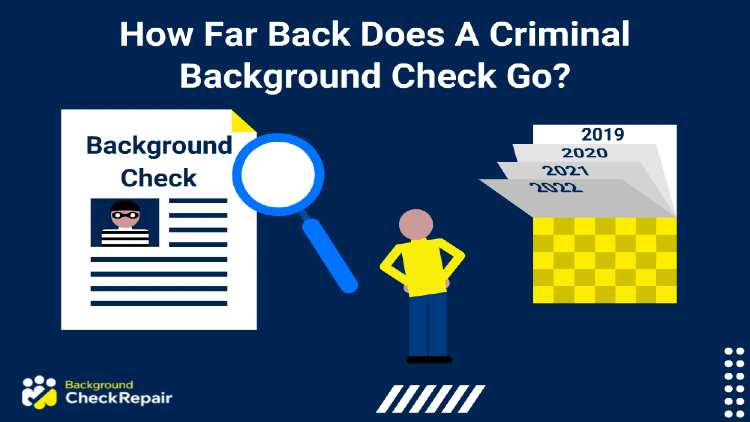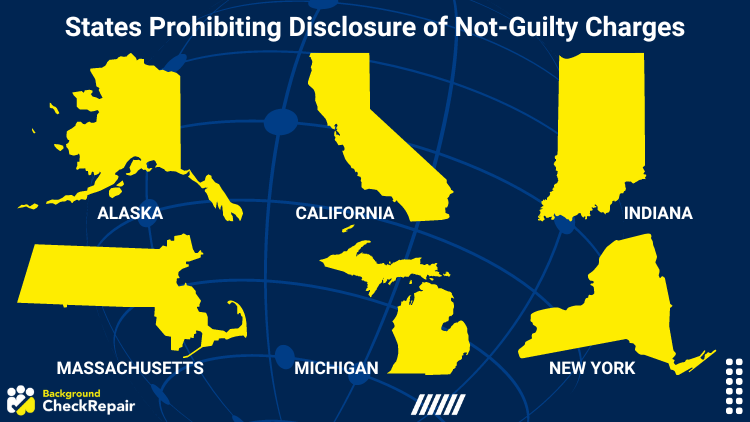
Background checks are intimidating enough, and with dozens of federal and state laws to consider, trying to figure out how far back does a criminal background check go can be difficult.
What makes things even worse is many states have laws that only apply to convictions and other laws that deal with how pending charges are reported as well.
That’s why knowing how far back a criminal records check goes for a specific criminal incident can help people determine whether their investigation report will show arrests, charges, and charges without conviction.
This guide can help.
How Far Back Does a Criminal Background Check Go for Arrests?
There are both federal and state laws to consider when trying to figure out how far back does a criminal background check go. Although many people may have heard of the seven-year rule or even 10-year rule for background screenings in other states, it’s important to understand that there are no federal laws that dictate how far back a criminal background check can go.
This can be disappointing for many people, however, there are several states that have specific laws regarding how far back employment background investigations can go when reporting convictions.
The Seven-Year Rule
Many people have heard mention of both the 7-year rule and the 10-year rule. As mentioned, these laws only apply to a few states, however, a typical background check will only go back about 7 years and sometimes ten, depending on specific circumstances.
This is not necessarily due to specific laws, instead, this is more of an industry standard among background screening companies. Regardless, many states do allow for criminal social security background checks to go back indefinitely.
States that follow the seven-year rule with exceptions are:
The list of 7-year states is rather short, but state laws that help protect those with criminal charges and help them find employment and felon-friendly apartments are becoming more and more common.
The practice of reporting an individual’s criminal history information from more than 10 years ago is exceedingly rare, despite its legality. This is more common in jobs in fields such as law enforcement, or jobs that deal with vulnerable groups.
It is also common for jobs with above-average salaries, such as corporate-level positions. However, individuals who have a criminal conviction from 15 years ago or more, often have nothing to worry about for most employment background checks.
Individuals who are worried about getting a criminal history check should also keep in mind that having a criminal record does not automatically disqualify an individual from many jobs. Although certain job fields and industries have federal laws and regulations regarding the automatic disqualification of someone with a criminal record, many jobs will hire on a case-by-case basis.
Laws on Reporting Arrests
When checking to see how far back an old arrest can be reported, things can get even more tricky.
Arrests are reported the same as convictions, in general. The way most criminal background checks work, whether they are performed by the hiring manager using a DIY method, or by a background check company authorized to conduct employment background checks, means that all criminal history will be reported.
Background checks are performed using public information such as police records, court documents, inmate and offender registries, and more. This means any public record that has the name of the individual on it will be reported, including arrests, warrants, misdemeanors, felonies, and others, regardless of conviction.
There are exceptions to this however, in particular, California does not allow arrests to be reported as part of a criminal background check unless that arrest ultimately results in a conviction. However, it’s important to realize that a background screening for a government job will include them.
Reporting Dropped Charges on Background Checks
Reporting arrests that didn’t lead to convictions, as well as other criminal history information such as dropped charges, is another common source of confusion. There are very few federal laws regarding what can and can’t be reported as part of a criminal history background check.
Expunged and sealed records are one of the few distinctions made by the FCRA when it comes to what companies can not report on a background check.
However, arrests that did not lead to convictions, as well as dropped charges, are technically legal to report, according to federal law. Several states have adopted laws that do not allow for certain irrelevant records to be reported to avoid unfair discrimination. (See the state table below)
How Far Back Does a Criminal Background Check Go for Charges?
Understanding the laws regarding how far back a criminal background check goes for criminal and civil charges is also confusing. There are no federal laws specifically regarding criminal charges and how they are reported as part of a background check.
The best recourse when doing a criminal records check on yourself is to search both law enforcement and court records to look for charges. Court records will show pending charges, charges that were filed against you, as well as other orders.
Charged But Not Convicted Records
All the states that have laws regarding the 7-year rule will have a 7-year limit for reporting charges, including those that didn’t lead to a conviction.
However, some states have laws specifically regarding charges that were dropped or did not lead to a conviction. For example, Kentucky has state laws that only allow for charges that lead to a conviction to be reported. However, there is no lookback limit for reporting these kinds of incidents.

States that have specific laws that prohibit background checks from reporting charges where the individual was found not guilty (Not convicted):
- Alaska
- California
- Indiana
- Massachusetts
- Michigan
- New York
In general, a typical criminal background check will show not just convictions but also pending charges. Similar to the rules regarding how far back a background check can go, there are several states that are the exception to this.
However, the vast majority of states will allow for pending changes to appear on a background screening.
In some instances, the pending charges won’t be visible on a background check. For example, if the charges were filed extremely recently, certain kinds of criminal background checks don’t access the most up-to-date databases, so it is possible the charges will be absent.

As with all information that shows up on a criminal background screening, an employer being aware of an applicant’s pending charges will not necessarily disqualify the applicant automatically. The hiring process will depend on the discretion of the hiring manager, so pending charges for low-level misdemeanors will be more likely overlooked when compared to pending changes for more serious crimes.
As mentioned, a few states will have specific laws regarding the way background check agencies are able to report pending charges on an individual. Most notably Arkansas and Kentucky have laws that apply.
In the state of Arkansas, only pending felony charges can be reported by a background check agency, so pending misdemeanor charges will not be reported as part of a criminal history check. Some industries do not need to follow this rule, such as law enforcement, but the vast majority abide by it.
Finally, since Kentucky only allows the reporting of criminal charges that result in a conviction, pending charges can not be reported until the trial process is complete and a guilty verdict has been reached.
Charges Filed Against You
In general, charges filed against you and warrants will show up on a background check. There are currently no federal laws that prohibit criminal charges, whether or not they resulted in a conviction, from showing up on a background check. However, just like many background check laws, there are a few states that will make an exception to this.

While most states are like California, which allows for all charges to show up on a background check, and even allows for employers to be notified if the charge results in a conviction, other states have laws prohibiting this practice.
Arkansas only allows for felony charges to be reported as part of a background check, and Kentucky only allows convictions to show up on a background check. This means dropped charges and charges that did not end in a conviction can not be reported in Kentucky as part of an employment criminal background check.
Charges are also considered to be “criminal history information,” so states that abide by the 7-year rule will not allow background check agencies to report on criminal charges of any kind that were filed more than 7 years ago.
Finally, although charges, misdemeanors, and pending charges can be reported in most states as part of a background check, many states have laws that do not allow employers to deny an applicant a job due to these charges.
Many of these states, such as Wisconsin, require employers to conduct assessments based on whether or not the criminal history information is relevant to the job duties.
Criminal Records Check Limit by State
The following table provides an overview of what crimes can be reported on a background check, for how long.
| State | Misdemeanors | Felonies | Charges | Arrests |
| Alabama | 10+ years | 10+ years | 10+ years | 10+ years |
| Alaska | 10+ years | 10+ years | 10+ years | 10+ years |
| Arkansas | 10+ years | 10+ years | 10+ years | 10+ years |
| California | 7 years* | 7 years | 7 years | 7 years |
| Colorado | 10+ years | 10+ years | 10+ years | 10+ years |
| Connecticut | 10+ years | 10+ years | 10+ years | 10+ years |
| Delaware | 10+ years | 10+ years | 10+ years | 10+ years |
| Florida | 10+ years | 10+ years | 10+ years | 10+ years |
| Georgia | 10+ years | 10+ years | 10+ years | 10+ years |
| Hawaii | 10+ years | 10+ years | 10+ years | 10+ years |
| Idaho | 10+ years | 10+ years | 10+ years | 10+ years |
| Illinois | 10+ years | 10+ years | 10+ years | 10+ years |
| Indiana | 10+ years | 10+ years | 10+ years | 10+ years |
| Iowa | 10+ years | 10+ years | 10+ years | 10+ years |
| Kansas | 7 years | 7 years | 7 years | 7 years |
| Kentucky | 10+ years | 10+ years | 10+ years** | 10+ years** |
| Louisiana | 10+ years | 10+ years | 10+ years | 10+ years |
| Maine | 10+ years | 10+ years | 10+ years | 10+ years |
| Maryland | 7 years | 7 years | 7 years | 7 years |
| Massachusetts | 7 years | 7 years | 7 years | 7 years |
| Michigan | 10+ years | 10+ years | 10+ years | 10+ years |
| Minnesota | 10+ years | 10+ years | 10+ years | 10+ years |
| Mississippi | 10+ years | 10+ years | 10+ years | 10+ years |
| Missouri | 10+ years | 10+ years | 10+ years | 10+ years |
| Montana | 7 years | 7 years | 7 years | 7 years |
| Nebraska | 10+ years | 10+ years | 10+ years | 10+ years |
| Nevada | 7 years | 7 years | 7 years | 7 years |
| New Hampshire | 7 years | 7 years | 7 years | 7 years |
| New Jersey | 10+ years | 10+ years | 10+ years | 10+ years |
| New Mexico | 10+ years | 10+ years | 10+ years | 10+ years |
| New York | 7 years | 7 years | 7 years | 7 years |
| North Carolina | 10+ years | 10+ years | 10+ years | 10+ years |
| North Dakota | 10+ years | 10+ years | 10+ years | 10+ years |
| Ohio | 10+ years | 10+ years | 10+ years | 10+ years |
| Oklahoma | 10+ years | 10+ years | 10+ years | 10+ years |
| Oregon | 10+ years | 10+ years | 10+ years | 10+ years |
| Pennsylvania | 10+ years | 10+ years | 10+ years | 10+ years |
| Rhode Island | 10+ years | 10+ years | 10+ years | 10+ years |
| South Carolina | 10+ years | 10+ years | 10+ years | 10+ years |
| South Dakota | 10+ years | 10+ years | 10+ years | 10+ years |
| Tennessee | 10+ years | 10+ years | 10+ years | 10+ years |
| Texas | 7 years | 7 years | 7 years | 7 years |
| Utah | 10+ years | 10+ years | 10+ years | 10+ years |
| Vermont | 10+ years | 10+ years | 10+ years | 10+ years |
| Virginia | 10+ years | 10+ years | 10+ years | 10+ years |
| Washington | 7 years | 7 years | 7 years | 7 years |
| West Virginia | 10+ years | 10+ years | 10+ years | 10+ years |
| Wisconsin | 10+ years | 10+ years | 10+ years | 10+ years |
| Wyoming | 10+ years | 10+ years | 10+ years | 10+ years |
*Misdemeanor marijuana convictions can only be reported for two years
** Kentucky only allows arrests and charges to be reported if they resulted in a conviction.
What Are 10-Year Background Check States? Criminal History Law
When trying to figure out how far back a criminal background check goes, many individuals will see the term 10-year background check states. These 10-year states are a little bit misunderstood. There are technically no states that have a 10-year limit on a background check. Every state either allows for background checks to go back 7 years or for them to go back indefinitely.
Where the term 10-year background check comes in for the exceptions that apply to the 7-year states. Each state that follows the 7-year rule will have specific exceptions that allow for background checks to go back to 10 years if the job meets certain criteria. In almost all the states the most common exception is the annual salary of the job.
Most often this number is $75,000 so jobs that are in seven-year states can look at criminal history information on applicants for up to 10 years if the salary is over this threshold. Some states, such as Washington, allow for 10-year background checks for jobs that make as little as $20,000 per year.
Getting a criminal history check can be a nerve-wracking process, especially for individuals who have a criminal record. However, more and more states are creating laws to make the question of “how far back does a criminal background check go?” easier to understand.
Frequently Asked Questions About How Far Back Does a Criminal Background Check Go





